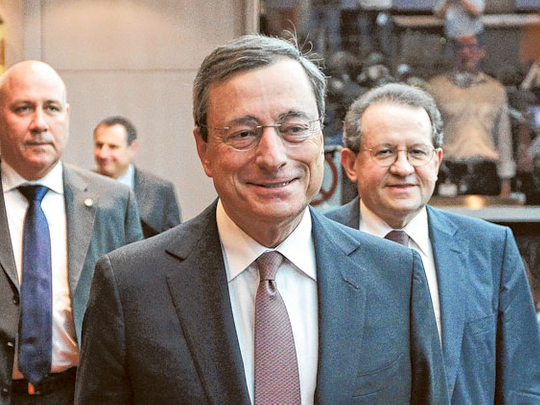
London: The euro rose on Thursday on interest from Asian sovereign investors and macro funds, but many refrained from aggressive buying as they anticipated European Central Bank comments on its strength.
The ECB kept interest rates on hold, as expected, with investors on awaiting comments from President Mario Draghi at a news conference about how the currency’s gains might affect the fragile euro zone economy.
While the chances of Draghi voicing any concern are slim, given trade-weighted euro has risen modestly since early last month, any hint of discomfort could drag the currency sharply lower.
On the other hand, if he sounds unconcerned about the euro’s rise and reiterates the G20’s commitment to market-determined exchange rates, the euro is likely to bounce and could retest recent highs.
“The key question Draghi will be asked is about currency wars,” said Neil Mellor, currency strategist at Bank of New York Mellon.
“He will likely say currency moves should be set by the markets, leading most to assume that the ECB is not prepared to do anything and the euro will probably go a little higher at the end of the meeting.”
The euro was up 0.3 pe rcent at $1.3565, holding steady after the rate decision. Analysts said it could retest Wednesday’s high of $1.3597 and move towards $1.38 and beyond in coming weeks if Draghi did not appear too concerned about its rise.
The currency had hit a 15-month high of $1.3711 on February 1.
If Draghi expressed concern, the currency could swiftly drop to its Jan. 29 low around $1.3414 and possibly lower, they said.
Against the yen, the euro was up 0.4 per cent at 127.10 yen, not far from its 34-month high of 127.71 yen hit on Wednesday. Traders cited stop loss sell orders at 127.50 yen and 127.70-75 yen, which could cap its gains for now.
The euro has risen nearly 3 per cent against the greenback so far this year and over 11 percent versus the yen. This has triggered unease among some European politicians.
The French have raised concerns a strong euro could derail exports and threaten a nascent euro zone recovery, but the Germans have said the shared currency is not overvalued.
Draghi sounded optimistic about a euro zone recovery last month, helping set the stage for a sharp euro rally. But this is unlikely to be enough to prompt the ECB chief to explicitly talk about the euro.
“Previous ECB President Jean-Claude Trichet had used the term “brutal” to describe euro gains,” said analysts at Morgan Stanley in a note. “However, we do not believe that the current euro rise is yet at the stage where it is impacting the ECB’s monetary stability mandate, requiring verbal intervention.”
Potential risks
Other potential risks to the euro would come from any comments Draghi makes on his connection to an Italian banking scandal, and on the recent rise in money market interest rates after some banks repaid ECB loans early.
“What Draghi might do is address concerns about declining liquidity in the euro zone and assure markets there is plenty of liquidity and it is too soon to tighten monetary conditions,” said Elisabet Kopelman, FX and FI strategist at SEB.
A Spanish bond auction earlier on Thursday drew healthy demand but a slight rise yields on the short-dated paper limited gains in the euro. The dollar was flat against the yen at 93.65 yen, not far from its 33-month peak around 94.075 yen hit on Wednesday. US speculative accounts were still actively buying the dollar on dips, with stop-loss orders said to be placed at 93.20 yen and just below 93 yen.
Sterling hit a session high of $1.5768 after incoming Bank of England governor Mark Carney showed little bias towards immediate looser monetary policy, wrongfooting many investors who had expected him to be more dovish.
It gave up some of those gains to trade at $1.5705 after the Bank of England kept policy unchanged, as expected, but flagged downside risks to the economy.












